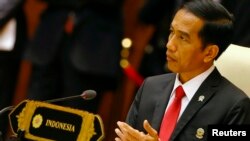Indonesian President Joko Widodo will visit the White House on Monday for talks with President Barack Obama that the Jakarta government says are likely to focus on investment, trade and the development of digital technology in Southeast Asia's largest economy.
The White House has not disclosed its agenda for the meeting, but analysts say topics are likely to include the country's smog crisis and human rights issues ranging from Indonesia's controversial death penalty policies to women's rights. Separately, Widodo is to confer with U.S. congressional leaders.
Faced with the task of providing Internet access throughout his far-flung nation of 18,000 islands, Widodo and a large contingent of tech leaders traveling with him will also meet with Microsoft, Facebook and Apple executives during a visit to Silicon Valley later in the week.
World Bank data show about 17 percent of Indonesia's 250 million people have access to the Internet.
A Jakarta spokesman said Saturday that Widodo would ask Google about extending Internet access to remote areas of the Indonesian archipelago with high-altitude-balloon technology. Information Minister Rudiantara, who uses just one name, said Apple has also voiced interest in building a research-and-development center in his country.
Ahead of the visit, human rights organizations urged Obama to press the Indonesian leader on his country's judicial death penalty policies, which have resulted in firing squad executions for at least 12 foreign nationals since Widodo took office last year.
All of the condemned prisoners had been convicted on drug-related charges.
In a report issued this month, Amnesty International also cited data showing that half of all prisoners interviewed on death row in Indonesia claimed to have been tortured, beaten or otherwise coerced into "confessing" to their alleged crimes.
Separately, Human Rights Watch called on Obama to use the White House meeting to address growing threats to women's rights and religious freedom in the world's largest Muslim nation.
Chief among the HRW complaints is a controversial policy requiring Indonesian police and armed forces to force female applicants to submit to virginity tests that are widely seen outside the country as discriminatory and degrading.
An HRW statement also cites local Indonesian governments for regulating how women must sit on motorcycles and the kinds of skirts and headscarves they can wear.





